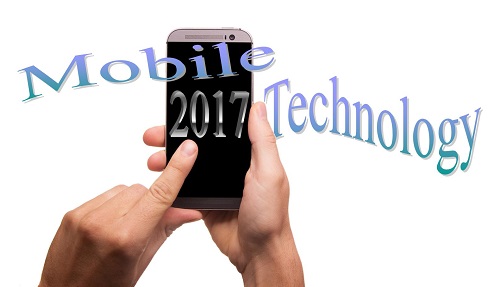A device to predict the future may not yet have been released, but industry analysts have their own forecasts.
Mobile technology truly solidified itself last year. It was no longer something new or luxurious. It became the standard and the vast majority of people have it. It is the new worldwide norm.
With a new year underway, industry influencers are weighing in with the direction they think 2017 will take.
This year’s mobile technology market will, after all, be taking a new direction. It’s no longer a matter of making itself mainstream. That has already happened. Fresh directions need to be taken in terms of both hardware and software.
 The entire concept of “mobile” is expanding. It’s not just a smartphone anymore. Last year planted the seed for the widespread growth of virtual reality, augmented reality, smart home gadgets and even the beginnings of artificial intelligence. So now we’re starting to wonder where that leaves us. In which direction will we take all this smart tech?
The entire concept of “mobile” is expanding. It’s not just a smartphone anymore. Last year planted the seed for the widespread growth of virtual reality, augmented reality, smart home gadgets and even the beginnings of artificial intelligence. So now we’re starting to wonder where that leaves us. In which direction will we take all this smart tech?
Industry analysts are taking a hard look at 2017 mobile technology and have some big predictions.
Among those mobile tech forecasts are the following:
• Changes in “reality” – the stage has been set for virtual reality, augmented reality is already hot (greatly thanks to Pokémon Go) and the iPhone 8 is rumored to be heading in a mixed reality direction. AR, VR and mixed reality are all headed toward more mainstream use.
• Artificial intelligence – we may not yet have reached the point where a robot housekeepers will be moving into our homes, but websites will be getting the next best thing through the more commonplace use of AI-based chatbots.
• Mobile Internet of Things – IoT has been a hot topic for the last handful of years but this year will start to see its use in a much more standard way now that smartphones are in the majority of people’s hands, handbags or pockets. For many, the smartphone is the core of a consumer’s connected life. In 2017, they will become a component of a broader smart environment.
To a certain degree, mobile technology will become so popular that it won’t need the word “mobile” to be used in many areas anymore. Online transactions and interactions will continue shifting away from desktop. The question is whether or not 2017 will bring the world to the point that web traffic is simply assumed to be mobile traffic – no specification needed.
A recent study has shown that consumers feel artificial intelligence will have taken over this tech in half a decade.
According to a survey conducted by researchers commissioned by Ericsson, many consumers are under the impression that within the span of five years from now, mobile technology in the form of smartphones will no longer exist.
This research was conducted by ConsumerLab, with the participation of 100,000 customers across 40 countries.
The study looked into the predictions and expectations of consumers with regards to mobile technology that will be used over the years to come, as well as what they would like to see in the future. Approximately half of the respondents to this survey said that by 2021, the most common forms of mobile tech – more specifically, smartphones – would no longer be in use by the year 2021. The reason, according to the survey respondents, would be that developments in artificial intelligence will have superseded many of the current functions of smartphones.
Many people feel that the concept of current mobile technology still carries too many levels of impracticality.
 According to Ericsson ConsumerLab’s Rebecka Cedering Ångström, “A smartphone in the hand, it’s really not that practical. For example, not when one is driving a car or cooking. And there are many situations where display screens are not so good. Therefore, one in two think that smartphones will belong to the past within five years.”
According to Ericsson ConsumerLab’s Rebecka Cedering Ångström, “A smartphone in the hand, it’s really not that practical. For example, not when one is driving a car or cooking. And there are many situations where display screens are not so good. Therefore, one in two think that smartphones will belong to the past within five years.”
Cedering Ångström also forecasted that the evolution of tech will make it possible for consumers to enjoy their downtime more effectively. She gave the example that someone could not only watch a football game, but they could also decide from which vantage point they would like to view it, or choose tow different places at once. She also pointed out that shopping could also be an experience that could be vastly improved through the use of virtual reality advancements, such as the ability to use VR to “try on shoes and see how they fit on your own feet.”
The Ericsson ConsumerLab head of research, Michael Björn explained that while some of the mobile technology future trend predictions discussed in the company’s report may seem to be rather futuristic, it shows that there is solid “consumer interest in new interaction paradigms such as AI and virtual reality (VR), as well as in embedding the internet in the walls of homes or even in our bodies.”
 The entire concept of “mobile” is expanding. It’s not just a smartphone anymore. Last year planted the seed for the widespread growth of virtual reality, augmented reality, smart home gadgets and even the beginnings of artificial intelligence. So now we’re starting to wonder where that leaves us. In which direction will we take all this smart tech?
The entire concept of “mobile” is expanding. It’s not just a smartphone anymore. Last year planted the seed for the widespread growth of virtual reality, augmented reality, smart home gadgets and even the beginnings of artificial intelligence. So now we’re starting to wonder where that leaves us. In which direction will we take all this smart tech?
 According to Ericsson ConsumerLab’s Rebecka Cedering Ångström, “A smartphone in the hand, it’s really not that practical. For example, not when one is driving a car or cooking. And there are many situations where display screens are not so good. Therefore, one in two think that smartphones will belong to the past within five years.”
According to Ericsson ConsumerLab’s Rebecka Cedering Ångström, “A smartphone in the hand, it’s really not that practical. For example, not when one is driving a car or cooking. And there are many situations where display screens are not so good. Therefore, one in two think that smartphones will belong to the past within five years.”